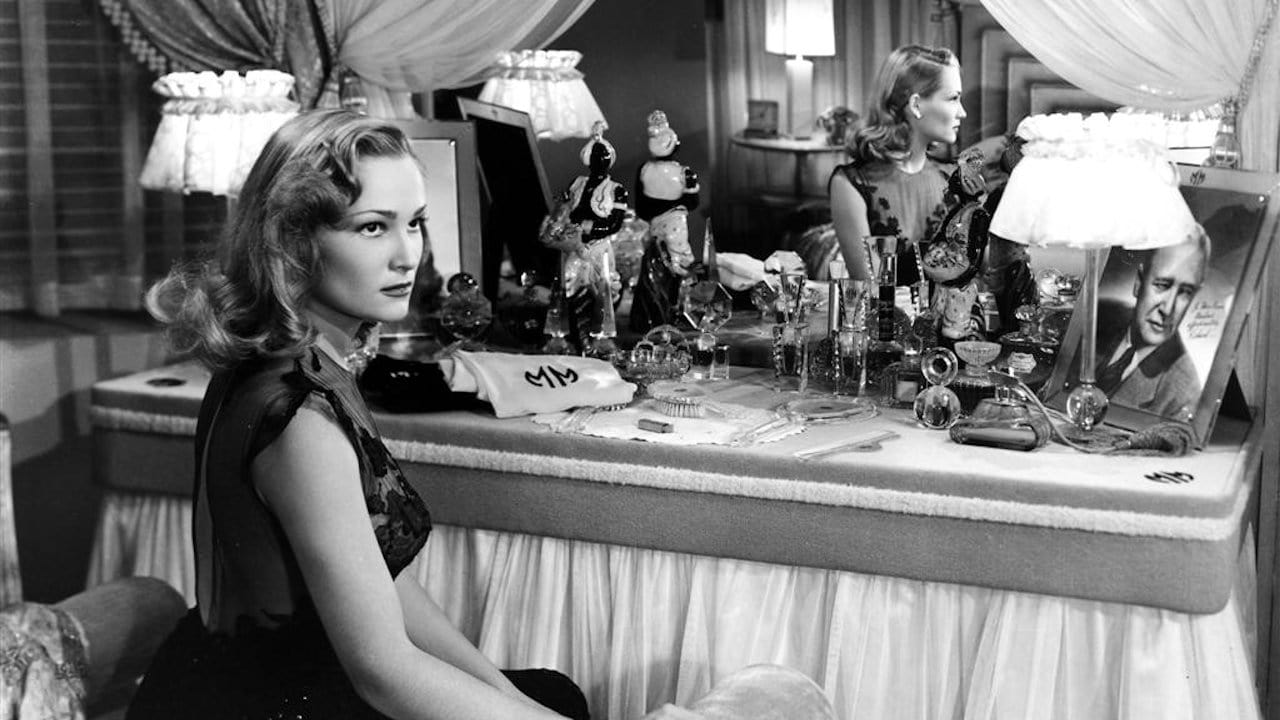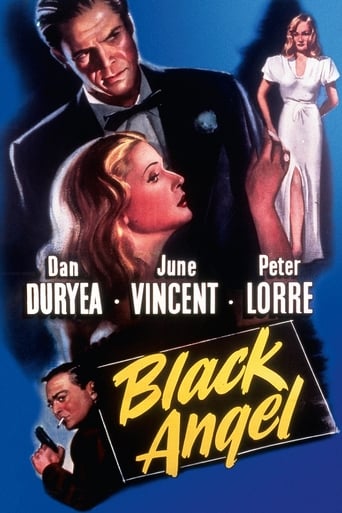



Absolutely Brilliant!
Simple and well acted, it has tension enough to knot the stomach.
View MoreWhile it doesn't offer any answers, it both thrills and makes you think.
View MoreIt's the kind of movie you'll want to see a second time with someone who hasn't seen it yet, to remember what it was like to watch it for the first time.
View MoreThis film begins with a man named "Martin Blair" (Dan Duryea) attempting to visit his wife "Mavis Marlowe" (Constance Dowling) in her high-rise apartment but being intercepted by the doorman and refused entry. Not long afterward another man by the name of "Marko" (Peter Lorre) is inexplicably allowed access which causes Dan to visit a nearby bar and become quite inebriated. The next morning Dan wakes up in his bed from his drinking binge and is told that his wife has been murdered. Not long afterward another man by the name of "Kirk Bennett" (John Phillips) is arrested and charged with the crime. He is subsequently tried and upon being found guilty he is incarcerated in prison to await execution in the gas chamber. Yet, in spite of all of the evidence against him, his wife "Catherine Bennett" (June Vincent) believes in his innocence and with nobody else to turn to decides to search for clues which might exonerate him. It's at this time that she happens to meet Dan and together they decide to conduct their own investigation which leads them directly to none other than—Marko. But there is a big difference between having a possible suspect and obtaining actual evidence which might free Kirk--and time is not on their side. Now rather than reveal any more I will just say that I found this movie to rather enjoyable for the most part with several twists and turns along the way. Unfortunately, I didn't care for the ending at all and because of that I have somewhat lowered my rating accordingly. Average.
View MoreI first saw Duryea long ago in Ministry of Fear where his bit dialing a phone number with a pair of scissors got my attention, and over the years his bad boy characters enlivened many a film. While not a deliberate scene stealer, he had a presence that took the spotlight away from the stars he supported, such as in the riveting final scene of Criss Cross. But in Black Angel HE is the star and that's what makes this film special. We first meet him at his worst, drunk and disorderly, a man drowning his sorrows after being dumped by his gorgeous, nasty wife, who has since been murdered. But when Duryea meets June Vincent, he shapes up and love blooms. We root for Vincent and Duryea to find the murderer so Vincent can divorce her cheating husband, marry Duryea, and live happily ever after in her cozy home in the suburbs of L.A. How very likable and nice are Vincent and Duryea. And how nice it is that neither of these likable people, mutually attracted as they are, acted on their feelings which, kept in check by the demands of sleuthing, are simmering just beneath the surface. However, the film's attempt to blend the story of a drunk reformed by love with a murder mystery does not quite succeed. But the schizophrenic screenplay does give Duryea the opportunity to deliver a star turn and he gives a dynamite performance. Black Angel is not considered a classic by the cognoscenti, but it's numerous virtues make it worthy of repeat viewing, especially when you're in the mood to spend quality time with Duryea and company.
View MoreSeeing this referred to so often as a "noir" raises the question, "What does 'noir' mean?" Usually it suggests a despairing mood, stark lighting and odd camera angles, and a femme fatale. I think that's what the Frogs originally had in mind. But using those criteria rules out films like "Black Angel." True, it was released in 1946, is in black and white, stars Dan Duryea, and involves a deadly serious search for a murderer, but that's about it. If our definitions get too generous, then Charlie Chan movies wind up in the "noir" category too.Roy William Neal, the proficient director who gave us a couple of Universal's Sherlock Holmes, has given us a straightforward murder mystery that lacks a lot of tension because of its weak structure -- Peter Lorre is in this, why? -- and an ending that is a variation on the "it-was-all-a-dream" climax, only in this case a nightmare. I have no idea who or what the title, "Black Angel", refers to. All the women here are perfectly normal. But I suppose there had been a successful "Blue Dahlia," "Black Dahlia", "Blue Gardenia," and "Fallen Angel" -- so, why not? Whatever happened to gardenias, by the way? You never hear about them anymore.I'd never heard of June Vincent, the girl in the case, but whatever her acting talents, she has an admirable bosom. I kind of like Dan Duryea too. If his acting range and this role were part of a Venn diagram there would be considerable overlap. He's not his usual woman-slapping cad, but his whiny voice projects a weakness that fits the character. I also rather like him because he was a graduate of the same college I attended. (Well, what the hell.) There's no particular reason to get into the plot. Duryea and Vincent team up to find out the real murderer of Duryea's wife -- before Vincent's husband is executed after having been mistakenly convicted of the crime. There's nothing shameful about the film. Everything in it is pretty routine.
View MoreBlack Angel (1946)What a vigorous, fast, surprising movie. This is a straight up crime film in a noir style, and Dan Duryea holds it up in his indecisive, regular guy kind of way. Duryea always has trouble as the leading man because he often plays a tough guy with a soft heart, and is a little whiny or annoying by design. It's an uncomfortable role to play, not quite sympathetic as the protagonist, not quite evil as the antagonist. A better B-movie, the budget just had enough room for someone like Duryea, and a small part for both Peter Lorre, who is fantastic (as usual) playing a suspicious night club owner, and Broderick Crawford, who is an oddly subdued detective. The leading woman, June Vincent, is fine in her part as an everyday woman caught up in an effort to save her husband from the death chamber, though she was chosen more for her singing than her acting. She and Duryea sing and play the piano together, and torch song music is central to the feel of the movie. Duryea might not actually be playing the piano but he does such a good job of faking it, he might have pulled it off.But what makes the film special? First of all, it's fast. The first twenty minutes have enough turns and dramatic climaxes for many entire movies. And then there's the filming, the visuals, which are vigorous and kinetic. The wild zoom in from the street up a tall building and into the room near the beginning is crazy--like low budget Gregg Toland from "Citizen Kane." But this is either cinematographer Paul Ivano, who is an uncredited photographer for part of "Frankenstein," believe it or not, or more likely the special effects guy, David Horsley, who helped with a whole slew of classics, including "Bride of Frankenstein," oddly enough. The scene near the end where Duryea is hallucinating is terrific, with its distortions.Whatever the faults of the movie (possibly the weakness of the female lead, who becomes the central character) it has so much surprise and velocity it is terrific anyway.
View More